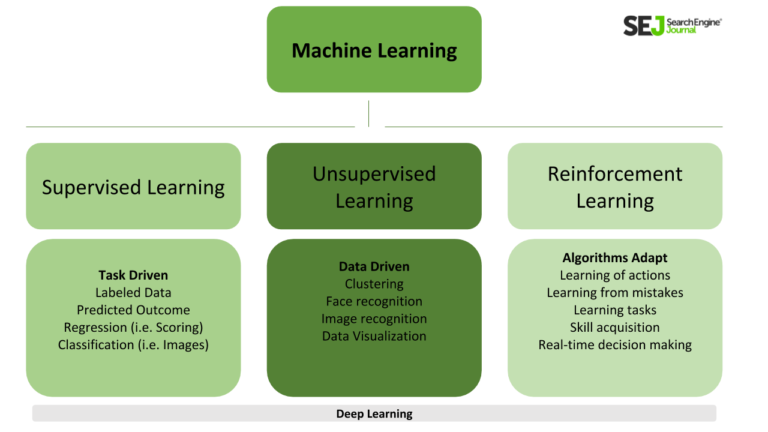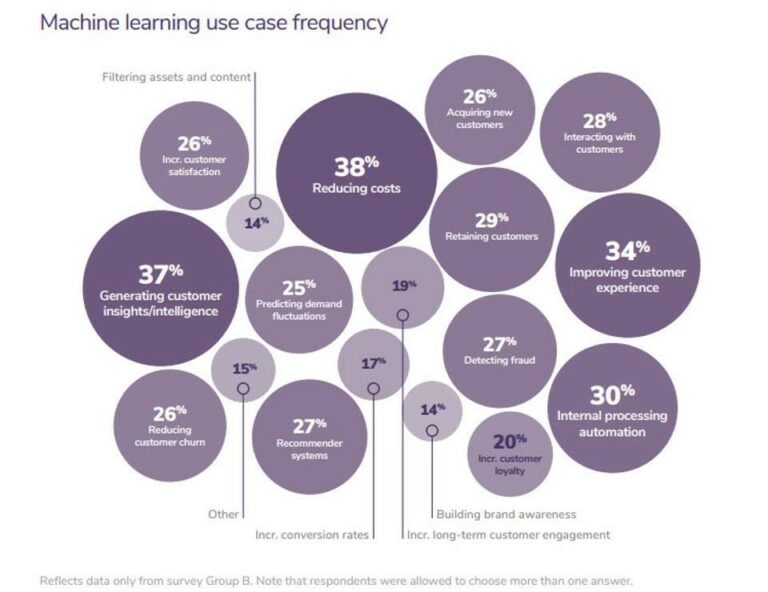15 Sep How Machine Learning Is Changing SEO & How to Adapt via @wburton27
People who consume online media are constantly changing.
These days, they look for instantaneous insights and results; making the role of machine learning even more important in SEO.
Marketers only need to look at recent developments with Google’s RankBrain to get a sense of how important it is to search marketing.
Current machine-based technology can boost business productivity by up to 40%, according to Accenture.
If you still aren’t sure how machine learning is changing SEO, it’s time to pay attention.
Machine learning is not new anymore – it’s been around and used for years.
But early adopters were able to reap the benefits.
For example, in 2017 Netflix saved $1 billion by using machine learning to make personalized recommendations.
Most recently, Google RankBrain has revolutionized how search results are determined.
Machine learning technology adapts and responds to data, learning over time to better answer search queries.
This helps provide better accuracy in search results at a speed beyond human capabilities.
As marketers, we are tasked often with doing more with less. And as search marketers, ROI and efficiency are prerequisites for success.
We must learn new skills and adapt to how things are rapidly changing with the rise of this technology.
If not you could soon notice a significant drop in your client’s search engine visibility, conversions, and traffic.
You might think it’s because of an algorithm update, but that may not be the case.
What it could be related to is machine learning changing the SERPs and causing your client’s site to slip further down the page where no one will see it.
What Is Machine Learning?
Before we go into what will change, let’s get a clear and straightforward definition of what machine learning is.
Machine learning is a subfield of artificial intelligence (AI) concerned with algorithms that allow computers to learn.
That’s according to Toby Segaran’s, “Programming Collective Intelligence” book.


Deep learning technologies (the next level of machine-learning) train themselves – based on neural networks.
This is where massive data sets are combined with pattern-recognition capabilities to find patterns and power self-learning to make decisions.
Why Are Things Changing?
Today’s consumer lives in an instantaneous world where they expect information and results delivered immediately.
That’s why Google, Facebook, Apple, and Amazon are putting machine learning at the heart of what they do so they can keep up and serve with speed, accuracy, and precision.
As SEO professionals, we need to do the same.
We have to keep up with this change with the SERPs while trying to make sense of the massive data sets.
We also have to constantly learn new skills required to find and act on search insights.
The human brain can hold the equivalent of a million gigabytes of memory, whereas machines can hold well over trillions of gigabytes.
Help is needed because the reality is that without help, this cannot be done as efficiently as we would all like.
How Will This Change the Role of SEO Professionals?
Google is continually learning how to better look at things and understand things in a much deeper way than ever before.
This allows them to provide better results to end users that satisfy their intent.
Your new responsibility is to make sure you have content that is relevant and useful in the moment across all devices, platforms, and content formats.
If your content fails to provide users with a positive experience, then you’re going to have a challenging time trying to rank in the top positions of the SERPs as the machines continue to learn and get smarter.
Google has a plethora of end-user data.
It helps Google understand what users find useful and relevant and allows the machine to understand user interests and preferences to better sort and rank the search engine results.
Google wants to connect great content to your clients’ potential customers along the customer journey.
Therefore, developing content around intent is the ideal way to go.
Machine learning can help with SEO – such as understanding of queries (intent), personalization, and voice search.
This means you can focus more on content experience and providing high-quality content experiences for your clients.
Both can be done through content development and optimization services across the fragmented user journey.
Many brands struggle with content development (machine learning can help) and always ask the following questions:
- What should I write about?
- What are the trending topics?
- What are users saying about my brand?
- I don’t have the resources to develop content. Can you help?
This is where a strong and useful content strategy, social listening, and new content development becomes critical.
They help find topics that people are talking about, trends, and content that help with the user’s problem in the moment.
Technical SEO – Will It Still Be Relevant?
Technical SEO will always be relevant.
However, as time goes on, the amount of time, resources, and the repetitiveness associated with technical SEO can be lessened since it will require less human interaction.
Google Search Console (GSC) will eventually be entirely run on machine learning technology, which will limit human interaction.
Remember though that machine learning is not there to replace but there to help.
Many software and platform vendors are building tools and applications that are SEO friendly and follow SEO best practices.
If you utilize the right machine learning technology, you can save time on tasks such as:
- Keyword research.
- Technical audits.
- Content optimization.
- Content distribution.
- Internal linking.
With less time needed for technical SEO, you can focus more on creating high-quality content based on intent.
How Will Structured Data Help?
Having structured data is extremely important to help the search engines better understand content and return more informative results to end-users.
Anytime you can give search engines data in a way that they can understand, it can help increase your visibility, indexation, and click-through rates.
Schema is a fantastic way to drive more organic traffic.
Having high click-through rates is an end-user signal that informs Google that your content is popular and users are engaging with it.
Structured data isn’t for every brand, but if you have a client that sells things online, schema can help enhance the search results by showing users:
- Product information.
- Prices.
- Reviews.
- Other valuable data points.
All of this can help convince users to buy more of your client’s products or services.
Link Quality
Today links are still important.
But it’s all about quality rather than quantity.
The more quality links you have from related domains, the higher your search engine rankings will be.
Even more, if you have high quality and useful content to support it.
I highly recommend that you conduct a link audit to see if any toxic links might be hurting your client’s search visibility.
Another essential component of any successful SEO campaign: monitoring your link portfolio.
Did your site lose any links?
Losing links from high authority sites could impact your search engine visibility and traffic.
Improving Customer Experience
Machine learning is already helping companies by reducing costs by 38%.
At the same time, it is helping to generate better customer insights & intelligence (37%) and improving customer experiences.


Machine learning is helping marketers by giving real-time insights into consumer behavior.
If you combine that with a keen focus on creating quality content, your results will improve.
If your content is popular and generates a lot of visits, users stay engaged with the content and interact with the content, and your site will dominate the SERPs.
Conclusion
SEO is rapidly changing with advances in machine learning.
It helps us far better understand intent – an essential signal for content that is relevant and of high quality.
It helps us sieve through massive amounts of data and gain actionable insights, and take action and do some laborious and tedious tasks for us.
The SEO community must adapt and help Google connect audiences with the right content at the right time and deliver the best content experience.
As SEO practitioners, we must provide content that:
- Is of high quality.
- Meets end-user intent.
- Gives end users a positive content experience.
- Is useful.
Things don’t stay the same forever.
Technology is getting better and will continue to shape every aspect of our lives and how we practice SEO.
We have to make sure we’re prepared for the future and not limit our SEO efforts on tactics and strategies that don’t work anymore.
Focusing on what’s important to get clients the results they are paying for.
We should let machine learning help do just that.
More Resources:
- A Practical Introduction to Machine Learning for SEO Professionals
- How Search Engines Use Machine Learning: 9 Things We Know for Sure
- Why SEO & Machine Learning Are Joining Forces
Image Credits
All screenshots taken by author
Sorry, the comment form is closed at this time.